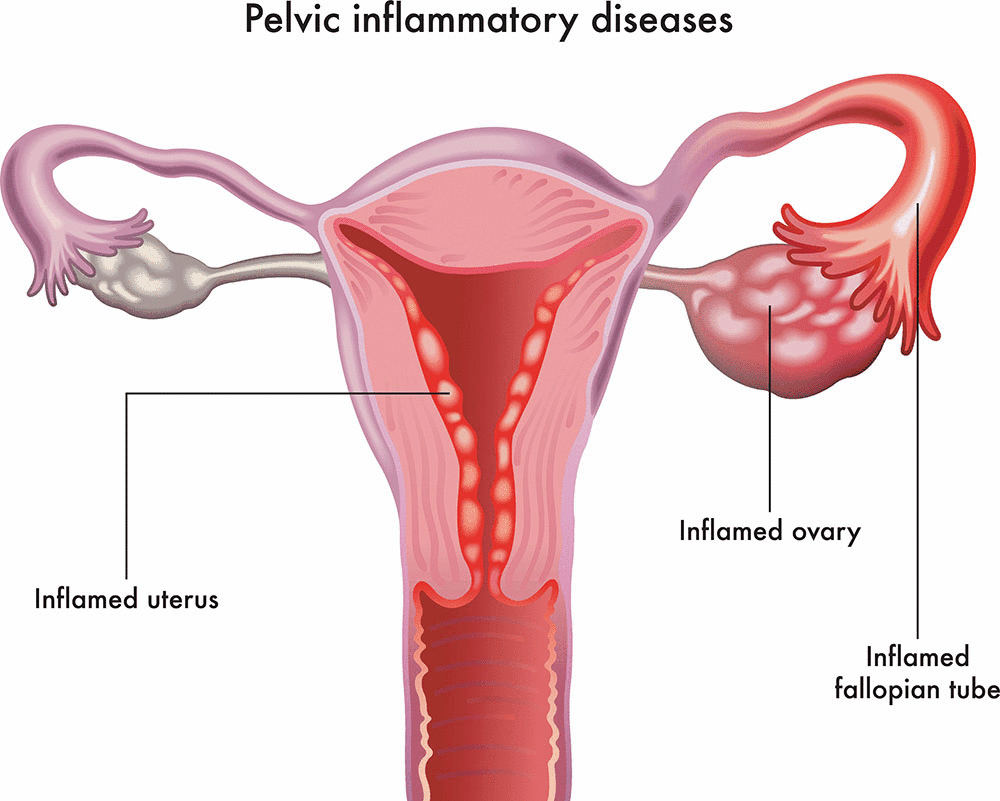Pelvic Inflammatory Disease

What is Pelvic Inflammatory Disease?
Pelvic Inflammatory Disease (PID) is an infection of the female reproductive organs, including the uterus, ovaries, and fallopian tubes. PID can cause significant damage to these organs and lead to chronic pelvic pain, infertility, and other serious complications.
Who's at risk for PID?
PID is most common in sexually active women under the age of 25. Women with multiple sexual partners, a history of sexually transmitted infections, and those who use intrauterine devices for birth control are at an increased risk for developing PID.
What causes PID?
PID is usually caused by bacteria that travels from the vagina or cervix into the reproductive organs. The most common bacteria responsible for PID are Chlamydia and gonorrhea. However, other bacteria can also cause PID.
How does PID start?
PID typically starts as an infection of the cervix or vagina and then spreads to the reproductive organs. Untreated sexually transmitted infections can increase the risk of developing PID. PID can also occur after childbirth, miscarriage, or abortion.
What are the symptoms of PID?
The symptoms of PID can vary, and some women may not experience any symptoms at all. However, common symptoms of PID include:
- Lower abdominal pain or cramping
- Abnormal vaginal discharge
- Painful or frequent urination
- Painful intercourse
- Irregular menstrual bleeding
- Fever or chills
- Nausea and vomiting
How is PID diagnosed?
PID is diagnosed through a physical examination and laboratory testing. A healthcare provider may perform a pelvic exam to look for signs of infection and order blood tests or a vaginal culture to identify the specific bacteria causing the infection.
How can PID be treated?
Treatment for PID typically involves a course of antibiotics to clear the infection. In severe cases, hospitalization may be necessary for intravenous antibiotics or surgery to drain abscesses. It is important to complete the full course of antibiotics and follow up with a healthcare provider to ensure the infection has been fully treated.
What complications may occur with PID?
Untreated PID can cause serious complications, including:
- Infertility: PID can cause scarring and blockages in the fallopian tubes, making it difficult for eggs to pass through and increasing the risk of infertility.
- Ectopic pregnancy: Scar tissue from PID can cause an egg to implant outside of the uterus, increasing the risk of a life-threatening ectopic pregnancy.
- Chronic pelvic pain: PID can cause chronic pelvic pain that can last for months or even years.
- Septic shock: In rare cases, PID can lead to sepsis, a life-threatening condition that occurs when the body's immune system overreacts to an infection.
How can I prevent PID?
The best way to prevent PID is to practice safe sex and use condoms consistently. It is also important to get regular screenings for sexually transmitted infections and seek prompt treatment if an infection is detected.
Long-term management of PID
After treatment for PID, it is important to continue regular check-ups with a healthcare provider to monitor for any ongoing issues or complications. Women who have experienced PID may also have an increased risk of developing it again in the future.
What is recent research saying about PID?
Recent research has focused on improving diagnosis and treatment of PID, as well as identifying risk factors for the condition. One study found that women who used hormonal contraceptives, such as birth control pills or hormonal IUDs, were less likely to develop PID than women who used barrier methods of contraception. Other research has shown that early diagnosis and treatment of PID can help reduce the risk of long-term complications.
Where can I go for more information on PID?
If you are concerned about PID or have symptoms of the condition, it is important to talk to a healthcare provider. They can perform a physical exam and order any necessary tests to diagnose and treat the condition. You can also find more information on PID from reputable sources such as the Centers for Disease Control and Prevention (CDC) and the American College of Obstetricians and Gynecologists (ACOG). These organizations provide resources on the prevention, diagnosis, and treatment of PID, as well as information on how to reduce the risk of developing the condition.

